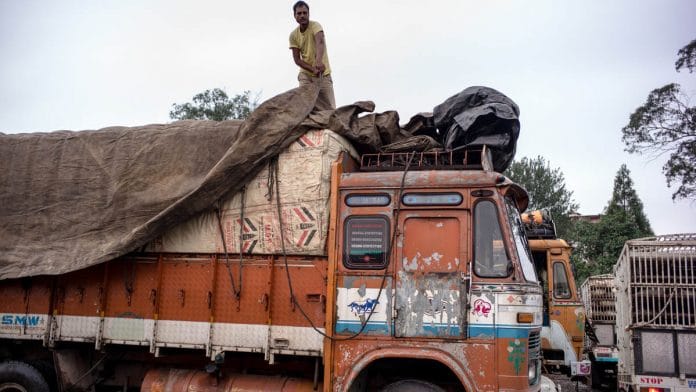Frequent changes and increasing compliance requirements in e-way bill, along with alleged corruption and rent seeking, troubling transporters.
New Delhi: Discontent is brewing among transporters battling frequent changes and increasing compliance requirements in the Goods and Services Tax’s e-way bill.
An alleged increase in instances of corruption and rent-seeking among GST departments of states is also causing heartburn among transporters.
An e-way bill is an electronic documentation detailing the movement of goods. It was rolled out from 1 April, 2018, as an anti-evasion measure to check the practice of non-reporting or under-reporting of transactions. It has to be generated by transporters or businesses for all movement of goods worth more than Rs 50,000 between states. For movement of goods within a state, this threshold varies.
Transporters are unhappy with the steep penalties being imposed on expired e-way bills, arguing that even small transgressions will wipe away the entire margins of a consignment. With no option of getting a second e-way bill issued against the same invoice number, transporters are further left in a quandary if the bills expire.
Frequent and random checks on goods are also hurting transporters.
E-way bills are issued for a particular time period depending on the distance to be traveled for the consignment.
‘Remove GST officials’
“We want GST officials removed from the highways,” said S.K. Mittal, president of the All India Motor Transport Congress.
“It is one thing to act on specific information and confiscate consignments. But nowadays, consignments are being randomly checked, hurting people who are genuinely doing business,” said Mittal.
“There are many unscrupulous transporters transporting goods without any documentation by paying bribes to the tax department officials. That is the reason why official GST collections are falling,” he said.
To be sure, the e-way bill rules have built in safeguards to prevent harassment by the tax department.
According to the e-way bill rules, goods can be inspected only once during the journey except in cases where specific information on tax evasion is received. Further, in case a vehicle is detained for more than 30 minutes, the transporter can report it on the portal.
The recent plan of the Modi government to integrate e-way bills with the FASTag, or electronic toll collection system, has also left transporters unhappy as they expect this to further add to their woes. It was aimed at monitoring the movement of trucks and the number of times it has crossed the tolls.
Also read: Urban affairs ministry demands 4 times more funds for states to overcome losses due to GST
‘Short-term solutions’
Transporters are also unhappy that the promises made during the ‘chakka jam’ strike called in July last year haven’t been kept by the government.
Abhishek Gupta, an office-bearer of Bombay Goods Transport Association, said most of the steps taken by the government, enumerated above, are short-term solutions to check tax evasion that penalise and add to the compliance burden of genuine taxpayers.
“The tax department is not able to appreciate the practicality involved in adhering to the e-way bill rules. States want to levy a penalty even in an IGST (integrated GST) transaction,” he said.
There are rising instances of state GST officers seizing goods of an inter-state transaction even though they have no powers to do so, added Gupta.
Also read: Demonetisation & GST have led to more revenue, better quality of life, says Arun Jaitley







The ministerial talent crunch is a fact of life. What has happened to the mandarins … If there are few admirers of our foreign policy / global diplomacy, there are now almost a thousand professional, covenanted diplomats. Sector by sector, the entire system is underperforming.